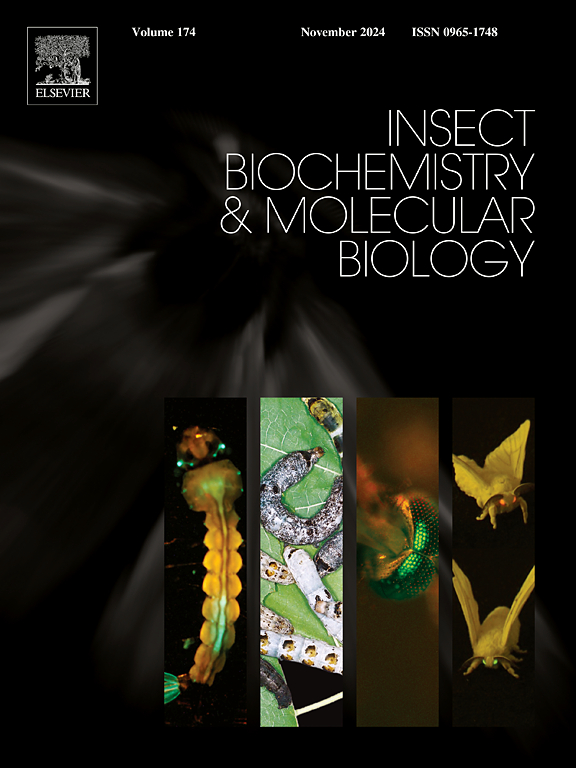睾丸特异性热休克蛋白基因在秋粘虫雄性生殖能力中起关键作用
IF 3.7
2区 农林科学
Q2 BIOCHEMISTRY & MOLECULAR BIOLOGY
引用次数: 0
摘要
热休克蛋白(Hsps)对应激反应和多种生理过程至关重要,但其在昆虫生殖中的功能尚不清楚。在本研究中,我们在秋粘虫(Spodoptera frugiperda)中鉴定了36个热刺蛋白基因,其中LOC118269601(命名为SfHsp68A)在睾丸中表现出强烈的特异性表达,在蛹睾丸发育期间达到峰值。CRISPR/ cas9介导的敲除SfHsp68A导致隐性男性不育,睾丸大小、精子数量和卵子孵化率显著降低。突变睾丸的转录组学分析显示,与线粒体功能、氧化磷酸化、能量代谢和活性氧(ROS)代谢相关的基因大幅下调。这些结果表明,SfHsp68A对s.f rugiperda的雄性生殖能力至关重要,可能是通过在精子发生过程中维持线粒体完整性和代谢稳态。这些研究揭示了睾丸特异性热蛋白在雄性生殖能力中的作用,并强调SfHsp68A是开发不育昆虫技术的潜在遗传靶点,为控制这种全球入侵害虫提供了一种环境可持续的策略。本文章由计算机程序翻译,如有差异,请以英文原文为准。

A testis-specific heat shock protein gene plays a critical role in male fertility in the fall armyworm
Heat shock proteins (Hsps) are critical for stress responses and multiple physiological processes, yet their function in insect reproduction remains underexplored. In this study, we identified 36 Hsp genes in the fall armyworm (Spodoptera frugiperda), of which LOC118269601 (designated as SfHsp68A) exhibited robust testis-specific expression, peaking during pupal testis development. CRISPR/Cas9-mediated knockout of SfHsp68A resulted in recessive male sterility, significantly reduced testis size, sperm counts, and egg hatch rates. Transcriptomic analysis of mutant testes revealed substantial downregulation of genes linked to mitochondrial function, oxidative phosphorylation, energy metabolism, and reactive oxygen species (ROS) metabolism. These results demonstrate that SfHsp68A is essential for male fertility in S. frugiperda, likely by maintaining mitochondrial integrity and metabolic homeostasis during spermatogenesis. These studies reveal that testis-specific Hsps function in male fertility and highlight SfHsp68A as a potential genetic target for developing sterile insect technology, offering an environmentally sustainable strategy for controlling this globally invasive pest.
求助全文
通过发布文献求助,成功后即可免费获取论文全文。
去求助
来源期刊
CiteScore
7.40
自引率
5.30%
发文量
105
审稿时长
40 days
期刊介绍:
This international journal publishes original contributions and mini-reviews in the fields of insect biochemistry and insect molecular biology. Main areas of interest are neurochemistry, hormone and pheromone biochemistry, enzymes and metabolism, hormone action and gene regulation, gene characterization and structure, pharmacology, immunology and cell and tissue culture. Papers on the biochemistry and molecular biology of other groups of arthropods are published if of general interest to the readership. Technique papers will be considered for publication if they significantly advance the field of insect biochemistry and molecular biology in the opinion of the Editors and Editorial Board.

 求助内容:
求助内容: 应助结果提醒方式:
应助结果提醒方式:


